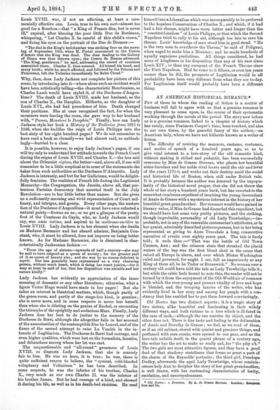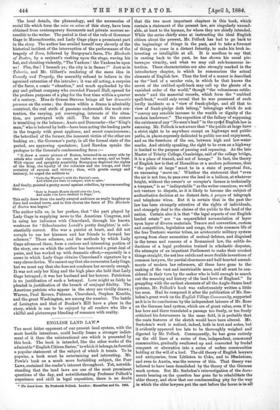AN AMERICAN HISTORICAL ROMANCE.* FEw of those to whom the
reading of fiction is a matter of business will fail to agree with us that a genuine romance is very pleasant to come upon, in the course of their systematic working through the novels of the period. The story now before us is a genuine romance, linked to a chapter of history which has rarely, since Fenimore Cooper's time, been touched, and also to our own times, by the graceful fancy of the author,—an American lady, whom we have not hitherto known as a writer of fiction.
The difficulty of reviving the manners, customs, costumes, and modes of speech of a hundred years ago, so as to give vital interest to a love-story of the old romantic kind, without making it stilted and pedantic, has been successfully overcome by Miss de Grasse Stevens, who places her beautiful sister-heroines and her noble rival lovers amid the stir and feier of the years 1775-6, and works out their destiny amid the social and historical life of Boston, when still under British rule. It is probably because the author was deterred by the unpopu- larity of the historical novel proper, that she did not throw the whole of her story a hundred years back, but has resorted to the somewhat cumbrous expedient of inspiring the young descendant of Anals de Grasse with a mysterious interest in the history of her beautiful great-grandmother. Her romance would have gained in literary value, if Miss de Grasse had discarded this expedient, but we should have lost some very pretty pictures, and the striking, though improbable, personality of old Lady Trowbridge ;—im- probable, not in any of the venerable centenarian's attributes, or in her quaint, admirably described picturesqueness, but in her being represented as giving to Anne Truesdale a long, consecutive narrative of events over eighty years past. The tale is finely told ; it ends thus :—" That was the battle of Old Town Cannon, Ann ; and the crimson stain that streaked the placid waters of the bay was the first blood shed in the cause that raised all Europe in alarm, and over which Mister Washington ruled and governed, for aught I see, full as imperiously as any King of them all, be he Tudor or Brunswick?' No woman over a century old could have told the tale as Lady Trowbridge tells it ; but while the critic feels bound to note this, the reader will not be turned by it from the enjoyment of the Old-World air of romance
with which the ever-young and present vitality of love and hope is blended, and the trooping fancies of the writer, who has evidently lived in her story and among her people with a con-
stancy that has enabled her to put them forward convincingly. Old B08€011 has two distinct aspects ; it is a tragic story of two sisters, alike beautiful and fascinating in their widely different ways, and both victims to a love which is ill-fated in the case of each,—although the one marries its object, and the other does not. There is fine taste and feeling in the delineation
of Anais and Dorothy de Grasse ; we feel, as we read of them,
as if an old cabinet, stored with quaint and precious things, and perfumed with rare scents, were opened to our gaze, and as the love-tale unfolds itself, in the quaint phrase of a century ago,
the writer has the art to make us really sad, for "the pity ol." The two girls are most attractive figures, and they have a good deal of that shadowy stateliness that forms so great a part of the charm of the Reynolds' portraits ; the third girl, Penelope Dudley, afterwards the aged Lady Trowbridge, whose reminis- cences help Ann to decipher the story of her great-grandmother, is well drawn, with her contrasting characteristics of levity, emulation, and unscrupulousness.
• Old BOSIOR : a Romano& By A. de Grasse Stoma. London; Boinwoa. Low And Co. The local details, the phraseology, and the accessories of social life which form the miss en scene of this story, have been obtained from contemporary documents and private sources ac- cessible to the writer. The period is that of the rule of Governor
Gage in Massachusetts, and Lady Gage plays a prominent part in the story. The author has availed herself very cleverly of the historical incident of the interruption of the performance of the
tragedy of Zara, followed by Burgoyne's farce, The Blockade of Boston, by a serjeant's rushing upon the stage, waving his
hat, and shouting violently, "The Yankees ! the Yankees be upon us! Flee, flee ! I beseech ye; the city is in flames !" Just as in
Taborin, and Mr. Gilbert's rendering of the same idea in Comedy and Tragedy, the assembly refused to believe in the agonised entreaties of the intruder; it was all acting, a surprise of the farce, a comic "situation," and much applauded by the gay and gallant company who crowded Fennell Hall, opened for the profane purposes of a play for the first time within a quarter of a century. Miss de Grasse Stevens brings all her dramatis personas on the scene; the drama within a drama is admirably
contrived, the real strife of passions underneath the mock con- tention, the varying, yet converging, interests of the situa- tion, are portrayed with skill. The fate of the sisters is trembling in the balance; Anais and Duncombe—the "King's man," who is beloved by both—have been acting the leading parts in the tragedy with great applause, and secret consciousness ; the betrothed of the former, the innocent victim of the other are looking on ; the Governor's party, in all the formal state of the period, are approving spectators ; Lord Rawdon speaks the prologue to the General's condescending farce :—
"It drew a comic picture of Boston, hemmed-in on every side by rebels who could claim no cause, no leader, no army, and no hope. With vigour and sprightly sensibility Bonrgoyne depicted the rights of the King, the loyalty of the colonists and the troops, and their certainty of success and victory ; then, with gentle energy and
leniency, he urged the soldiers to .
• Unite the Warrior's with the Patriot's care, And whilst you burn to conquer, wish to spare.'
And finally, pointed a pretty moral against rebellion, by recommending that,—
' Duty in Female Hearts should give the Law, And make e'en Love obedient to Papa.'
This sally drew from the easily-swayed audience as ready laughter as Zara had evoked tears, and to this chorus the farce of The Blockade of Boston was begun."
The author tells us, in her preface, that "the part played by Lady Gage in supplying news to the American Congress, and in using her influence with Cleaveland, through his known weakness for Schoolmaster Lovell's pretty daughter,' is sub- stantially correct. She was a patriot at heart, and did not scruple to use her kinsmen and her friends to forward her schemes." Those schemes, and the methods by which Lady Gage advanced them, form a curious and interesting portion of the story, one on which the author has bestowed a great deal of pains, and has worked up with dramatic effect,—especially in a scene in which Lady Gage obtains Cleaveland's signature by a very clever device. We cannot say that she exonerates Lady Gage, but we must say that she does not condemn her severely enough. It was not only her King and the high place she held that Lady Gage betrayed; it was her husband and her honour. Patriotism is no justification of such a betrayal. Love might as fairly be pleaded in justification of the breach of conjugal fidelity. The American patriots who appear in the story are vividly drawn ; Warren, Paul Revere, Putnam, Cleaveland, Stephen Kemble, and the great Washington, are among the number. The battle of Lexington and that of Bunker's Hill have a place in the story, which is one to be enjoyed by all readers who like a skilful and picturesque blending of romance with reality.















































 Previous page
Previous page